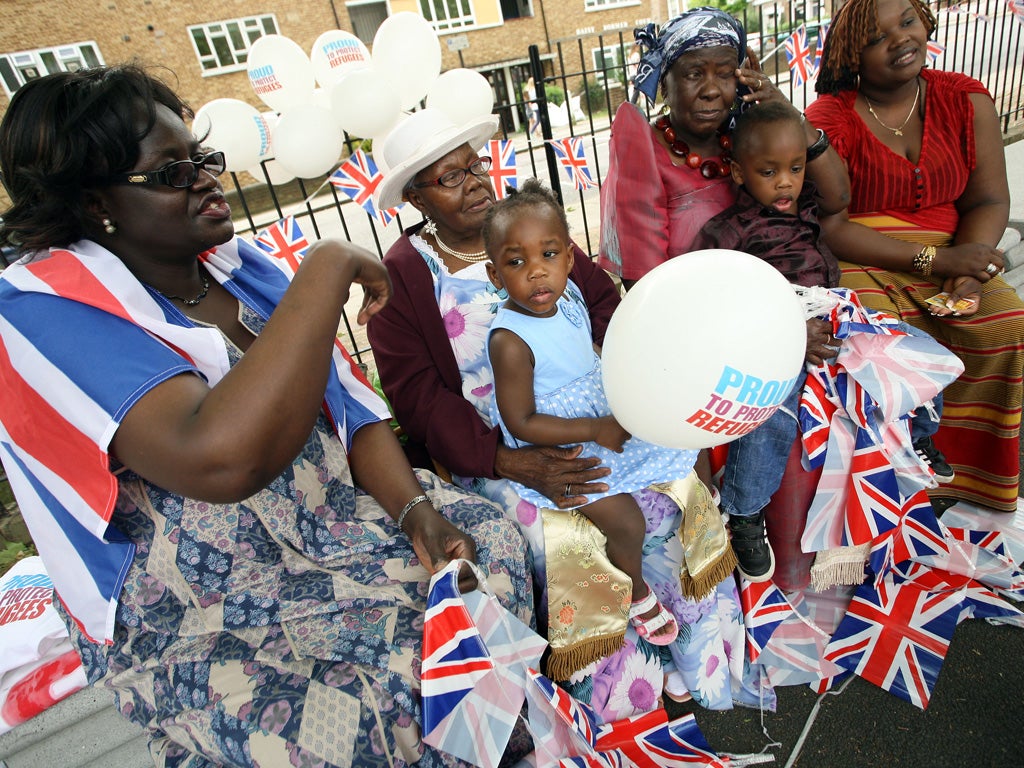Jubilation for the new Britons who made monarch their own

Your support helps us to tell the story
From reproductive rights to climate change to Big Tech, The Independent is on the ground when the story is developing. Whether it's investigating the financials of Elon Musk's pro-Trump PAC or producing our latest documentary, 'The A Word', which shines a light on the American women fighting for reproductive rights, we know how important it is to parse out the facts from the messaging.
At such a critical moment in US history, we need reporters on the ground. Your donation allows us to keep sending journalists to speak to both sides of the story.
The Independent is trusted by Americans across the entire political spectrum. And unlike many other quality news outlets, we choose not to lock Americans out of our reporting and analysis with paywalls. We believe quality journalism should be available to everyone, paid for by those who can afford it.
Your support makes all the difference.When Paul Sathianesan got off the plane at Gatwick Airport to begin a new life in a new country, all he had with him were two shirts, two pairs of trousers, a sarong and a container of soil from his homeland, Sri Lanka.
Mr Sathianesan, 51, was an asylum seeker in 1985. Twenty-three years later he became mayor of the London borough of Newham and today, he says, he presides over 100 citizenship ceremonies every week.
Yesterday Mr Sathianesan was one of dozens of former refugees who came to Brixton, in south London, for what was billed as the first of hundreds of Jubilee street parties, organised by the Refugee Council and the think-tank, British Future.
It was perhaps fitting that one of the first parties to celebrate the Queen's 60 years on the throne should be held by people who embody not only the change that has been witnessed in Britain since 1952, but also the values of stability and decency that, for everyone here at least, represent the Queen's most abiding influence on British life.
Bob Vertes, 64, a lecturer and former teacher from north London, was eight when he arrived in Britain at the very beginning of the Queen's reign.
His family fled Hungary in 1957, fearing persecution because of their Jewish faith, following the upheavals of the 1956 revolution.
For them, Britain under a new queen represented "safety, tolerance and opportunity" and when he had to choose his nationality at the age of 16, Mr Vertes did not hesitate.
"At my core I am British," he said. "I wouldn't have had the opportunities that I have had in life without Britain and I greatly admire the diversity of culture you find here. It is not the case in many countries. I still believe that Britain is a light in the world for its tolerance and diversity."
British Future found in a recent survey that British citizens who were not born in the country tend to have a stronger sense of belonging to Britain and with it greater admiration for the Queen, than British-born citizens.
"The fact that the Queen has been on the throne for 60 years is testament to the stability that Britain has enjoyed in that time," said Donna Covey, chief executive of the Refugee Council. "For [people] who have faced persecution and conflict in their first countries, that is something to be celebrated."
Emad Altaay, 38, arrived more recently with his wife and two daughters, but is as determined at the Vertes family was to make a home here.
He said: "We moved to Jordan to escape the violence in 2005, but could not make a home there. In 2010 we had an opportunity to start a new life in Britain and I have come to celebrate this weekend to say thank you." Santa Ida Aber, 47, who fled Uganda in 1990, said that, for all the symbolism of monarchy, she admired the Queen as a strong woman with "a passionate sense of duty, carrying great responsibility very well". "She is the head of a family and like all heads she deserves great respect," said Ms Aber. "Since I came I have had two children and a grandchild in peace. I feel I owe that to Britain and to the Queen."
Join our commenting forum
Join thought-provoking conversations, follow other Independent readers and see their replies
Comments